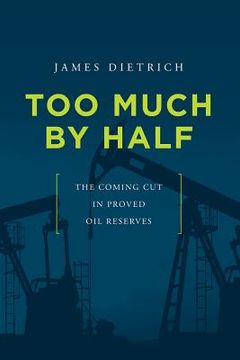Reseña del libro "Too Much by Half: The Coming cut in Proved oil Reserves (en Inglés)"
The year was 2007 and the financial world was crashing. The setting was my residence in Moscow, Russia. A visiting American PhD economist working for the Russell 2000 asked me, "And how good are the estimates of proved oil reserves in your industry." She knew that mathematical models are used to predict value and risk in her world of money and in my world of oil. Perhaps she felt a sense of humiliation - the financial models had totally failed. I recall my response, "It seems that a barrel of oil reserves becomes three barrels if it's under Russia." That was a flip answer, but perhaps not that exaggerated. Her question stayed with me. Eight years later given even more international consulting experience, my sober answer became, "Proved oil reserves are too much by half." In other words, globally and on average, three barrels of publicized oil reserves are actually closer to two barrels. Here we're talking only about proved reserves. These are hydrocarbon volumes that are estimated with reasonable certainty to be commercially recoverable. In probabilistic terms, use of the words "reasonable certainty" implies there is a 90% chance of meeting or exceeding the quoted recoverable volumes. During periods of rising and falling oil prices, oil companies increase and decrease their estimates of proved reserves, in order to satisfy the requirement that the reserves are commercially recoverable. This is the story of how reserves have become systematically inflated, aside from any influence of rising oil prices. The book is part way between memoir and non-fiction - too much of one to be properly the other. Dubbed narrative non-fiction, it may appeal to those interested in the "peak oil" debate, an international consulting career, expat living, or simply the absurdity of people trying to work together. My views on the reserves question are derived from working independently for decades inside Big Oil as a consultant. They are likely to differ from the perceptions of outsiders who rely on material made available for public consumption. Consider the attorney working as a financial services executive who has written a book about oil in 2016. He tells us we're at the dawn of the fossil fuel era, touting that his book "... incorporates facts from leading authorities and firsthand sources, such as the revenue predictions of major oil companies and the United States government." Since when are we expected to accept an equivalence between facts and predictions? The book was written to counter the claims that we are awash in oil. A term called the R/P ratio is central to the debate on peak oil. It's the ratio of known reserves to the rate of use - the ratio is about 40 years for oil and 60 years for natural gas. If world reserves are indeed over-booked by half, those estimates shorten to nearly 25 years for oil and 40 years for gas. We will likely have a lot less time to move away from the use of fossil fuels before the tanks are empty. And then consider: The worldwide supply of oil, as of any mineral resource, will rise from zero to a peak and after that will decline forever. The crisis comes not when the last drop is pumped; it arrives when we've consumed nearly half the oil there ever was. At that point, steadily falling supply can not meet continuing rising demand. Nearly all the pundits agree that we're close to the half-way point. The book reads mostly as memoir, telling the story as a chronology of projects in which the author was retained as a consulting engineer to estimate, develop and produce reserves. The reader will get the sense that as we're nearing the half-way point, it's nature - geology and physics - that is preventing us from unlocking more oil from mature reservoirs, never mind oil prices!

